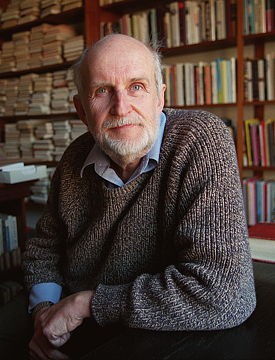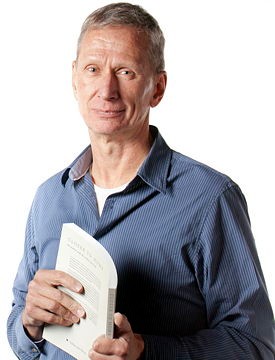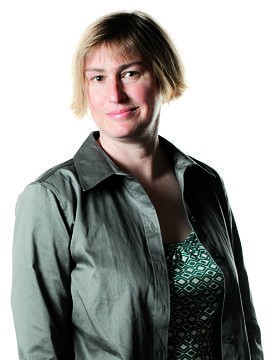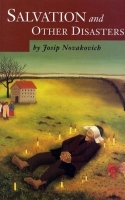Beyond its educational allure as a first-choice institution for many aspiring young writers, Concordia is well positioned in the heart of Montreal’s booming multilingual arts scene — a huge draw for international students. “Montreal tends to be a city that attracts writers,” says Jill Didur, associate professor and chair of the Department of English. “It’s a very lively city and there’s a large community of anglophone writers here. Many of our faculty and graduates contribute to programming and events that take place around Montreal.”
Bolster agrees. “There’s a strong spoken-word scene [writers who perform their work on stage] and a strong digital media community in Montreal, and that’s becoming increasingly important for some of the students in our program,” she says. “It’s a vibrant and relatively affordable city to live in, and this attracts a lot of students from elsewhere.”
Accomplished faculty
For Byrnes, the strengths of the Creative Writing Program lie in faculty members’ openness to various artistic viewpoints. “Faculty are very adept at switching into other aesthetic perspectives. One sign of this is their ability to pinpoint a graduate student’s strengths and to direct that student to a colleague who might be an ideal thesis supervisor,” he says. “There is none of that kind of resentment that’s based on political or ideological commitments to art that one sometimes finds in both English literature and creative writing programs. I can honestly say that everyone in the program is entirely committed to the best teaching and supervision that a student can be given.”
Professors’ reputations as top teachers, mentors and distinguished writers in their own right inspire creative writing students to pursue their degrees at Concordia, says Didur. “Pretty much every creative writing student who applies to our program specifies an interest in working with a particular professor. Students are very aware of who our faculty are.”
And they are, largely, winners and nominees of prestigious national and international literary honours. Assistant professor Sina Queyras, MA (Eng.) 95, for example, is a prize-winning poet whose work was shortlisted for both the Governor General’s Award and the Amazon First Novel Award. Queyras’s literary journal, “Lemon Hound” (lemonhound.blogspot.ca), is one of “the best known online poetry journals in North America,” says Didur. Another faculty member, Professor Josip Novakovich, was recently short-listed for the Man Booker International Prize for fiction. (To read an excerpt of Novakovich’s work, see Iceon page 33.)
“Our faculty are doing their best to keep active careers themselves,” says Bolster. “This creates a dynamic environment for our students.”
Star alumni
Concordia’s creative writing students have done their teachers proud. “I cannot think of a significant literary prize in the country for fiction or poetry that one of our students has not won,” says Byrnes. From Johanna Skibsrud, MA 05, whose bookThe Sentimentalist won the 2010 Scotiabank Giller Prize, to two-time Governor General’s Literary Award winner Nino Ricci, MA 87, who won in 1990 for The Lives of Saints and in 2008 for The Origin of Species, to Kate Hall, MA 06, whose book The Certainty Dream was shortlisted for the 2010 Canadian Griffin Poetry Prize, Concordia alumni have made an indelible mark in the literary world.
“Carmine Starnino [MA 01], one of the most important poet-critics in the country, was co-founder of Maisonneuve, while Arjun Basu [BA 90] was the editor of Air Canada’s enRoute magazine,” Byrnes adds.
Bolster points out that creative writing graduates aren’t limited to pursuing careers in the arts. “Alumni of our program are everywhere — not just in the expected places. We have alumni who are writing video games, doing journalism, teaching in CEGEPS, teaching ESL or doing translation work,” she says. “Wherever they are, they bring attentiveness to language and to communication that has been enriched through their time in the Creative Writing Program.”
A glimpse into the future
In addition to a new Creative Writing Program curriculum, the Department of English is currently developing an MFA program that will enable students to take courses in other non-English disciplines that contribute to their creative work. “The program will broaden to accommodate an all-consuming sensibility that writers have,” says Byrnes. “They need to know so much about the world and we are helping them do so by giving them access to all kinds of studies which will feed their creative work.”
Reflecting on the program’s early days and the degree to which it has flourished, Clark Blaise appreciates its ongoing success and enduring reputation — a reputation he established from the start. “I run across graduates of the Creative Writing Program in the States and Canada who I had nothing to do with, but they knew to go to Concordia as the place for polishing and for learning fundamentals,” says Blaise, who is currently penning his fourth novel and 25th book. “They felt confident that once they left, they had not only passed the bar — they had risen above the bar. The bar was sufficiently high that if you got your degree at Concordia and went through the Creative Writing courses, you were as prepared as anyone else anywhere in the world.”
If not more so.
— Aviva Engel, BA 02, is a Montreal freelance writer


 Creative Writing Program founder Clarke Blaise received an honorary doctorate from Concordia in 2013. Credit: Patrick Doyle
Creative Writing Program founder Clarke Blaise received an honorary doctorate from Concordia in 2013. Credit: Patrick Doyle
 Terence Byrnes, the Creative Writing Program’s coordinator until fall 2013, designed its new curriculum. Credit: David Ward
Terence Byrnes, the Creative Writing Program’s coordinator until fall 2013, designed its new curriculum. Credit: David Ward
 Department of English Chair Jill Didur says the Creative Writing Program’s award-winning faculty are a great draw for students. Credit: David Ward.
Department of English Chair Jill Didur says the Creative Writing Program’s award-winning faculty are a great draw for students. Credit: David Ward.
